Diplomatic protection 外交保护
浅析国际法中的外交保护制度

浅析国际法中的外交保护制度作者:玛柯芭莉·夏里甫汗来源:《大经贸》2018年第03期【摘要】国家对外的重要职能之一就是保护本国国民,而外交保护是国家履行这一职能最重要的法律手段之一。
外交保护制度是一项重要的国际法律制度,也是主权国家作为国际行为体在国际法律关系中应享有的权利。
根据国家主权平等原则和属人管辖原则,作为国际法主体的国家有权通过本国外交机关对在国外的本国侨民或公民提供保护,特别是本国侨民或法人的合法权益在外国受到侵犯时,国籍国有权对该侵权国提起国际诉讼或进行其他外交交涉,并对有关损害要求赔偿,这就是外交保护权。
中国的国际地位随着全球化的深入和中国国际影响力的扩大在提升,外交保护制度对于中国有着更为特殊的意义,认真研究外交保护制度对于保护中国公民在海外的合法权益,有着非常重要的意义。
【关键词】外交保护国际法海外利益中国1 外交保护的概念辨析1.1 外交保护的政治渊源外交保护(Diplomatic Protectior)作为国家保护本国国民的手段之一,是现代国际法重要的组成部分。
然而,就发展历史而言,“外交保护,相比海洋法和领土法,在国际法中是一个年轻的事物。
尽管该制度被确信在瓦特尔于1758年发表的论著中已被提及,然而就文献显示,在18世纪后期和19世纪早期之前没有被记录下来的相关例子。
“瓦特尔是第一个将注意力投向保护外国人及其财产利益的国际法经典学者。
他在某种程度上是该制度的精神之父,因为他第一个为该制度提供了一种可以被接受的理论基础,即瓦特尔拟制。
”作为一种文明的和相对完善的保护手段,外交保护在现代社会得以继续发展和进步,国际社会一直以来并没有制定过关于外交保护的国际条约。
鉴于此,联合国大会在1995年同意联合国国际法委员会就外交保护问题进行长期研究,并编纂条款草案。
经过不懈的努力,国际法委员会最终在2006年第58届会议上二度通过了《外交保护条款草案》。
1.2 外交保护的定义与弊端外交保护是国际法上主权国家保护本国公民最重要的手段之一,但长期以来围绕外交保护完整、全面定义的条件尚不成熟,外交保护的基本概念和主要手段,目前为止在国际社会与学术界都存在比较大的分歧。
海外公民保护
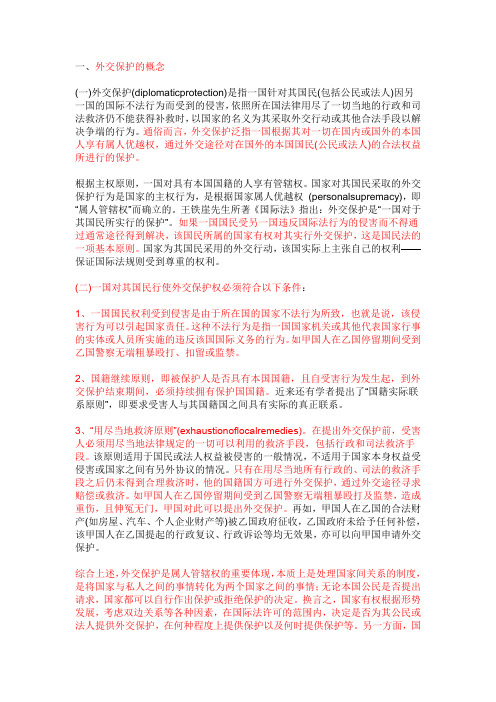
一、外交保护的概念(一)外交保护(diplomaticprotection)是指一国针对其国民(包括公民或法人)因另一国的国际不法行为而受到的侵害,依照所在国法律用尽了一切当地的行政和司法救济仍不能获得补救时,以国家的名义为其采取外交行动或其他合法手段以解决争端的行为。
通俗而言,外交保护泛指一国根据其对一切在国内或国外的本国人享有属人优越权,通过外交途径对在国外的本国国民(公民或法人)的合法权益所进行的保护。
根据主权原则,一国对具有本国国籍的人享有管辖权。
国家对其国民采取的外交保护行为是国家的主权行为,是根据国家属人优越权(personalsupremacy),即“属人管辖权”而确立的。
王铁崖先生所著《国际法》指出:外交保护是“一国对于其国民所实行的保护”。
如果一国国民受另一国违反国际法行为的侵害而不得通过通常途径得到解决,该国民所属的国家有权对其实行外交保护,这是国民法的一项基本原则。
国家为其国民采用的外交行动,该国实际上主张自己的权利——保证国际法规则受到尊重的权利。
(二)一国对其国民行使外交保护权必须符合以下条件:1、一国国民权利受到侵害是由于所在国的国家不法行为所致,也就是说,该侵害行为可以引起国家责任。
这种不法行为是指一国国家机关或其他代表国家行事的实体或人员所实施的违反该国国际义务的行为。
如甲国人在乙国停留期间受到乙国警察无端粗暴殴打、扣留或监禁。
2、国籍继续原则,即被保护人是否具有本国国籍,且自受害行为发生起,到外交保护结束期间,必须持续拥有保护国国籍。
近来还有学者提出了“国籍实际联系原则”,即要求受害人与其国籍国之间具有实际的真正联系。
3、“用尽当地救济原则”(exhaustionoflocalremedies)。
在提出外交保护前,受害人必须用尽当地法律规定的一切可以利用的救济手段,包括行政和司法救济手段。
该原则适用于国民或法人权益被侵害的一般情况,不适用于国家本身权益受侵害或国家之间有另外协议的情况。
论外交保护中的用尽当地救济规则
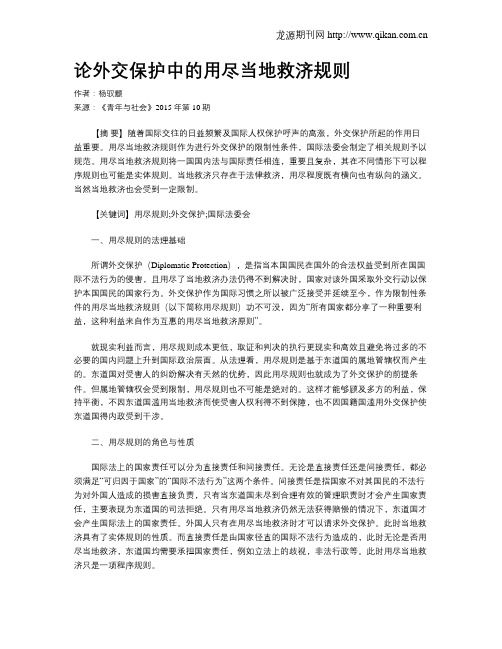
论外交保护中的用尽当地救济规则作者:杨驭颥来源:《青年与社会》2015年第10期【摘要】随着国际交往的日益频繁及国际人权保护呼声的高涨,外交保护所起的作用日益重要。
用尽当地救济规则作为进行外交保护的限制性条件,国际法委会制定了相关规则予以规范。
用尽当地救济规则将一国国内法与国际责任相连,重要且复杂,其在不同情形下可以程序规则也可能是实体规则。
当地救济只存在于法律救济,用尽程度既有横向也有纵向的涵义。
当然当地救济也会受到一定限制。
【关键词】用尽规则;外交保护;国际法委会一、用尽规则的法理基础所谓外交保护(Diplomatic Protection),是指当本国国民在国外的合法权益受到所在国国际不法行为的侵害,且用尽了当地救济办法仍得不到解决时,国家对该外国采取外交行动以保护本国国民的国家行为。
外交保护作为国际习惯之所以被广泛接受并延续至今,作为限制性条件的用尽当地救济规则(以下简称用尽规则)功不可没,因为“所有国家都分享了一种重要利益,这种利益来自作为互惠的用尽当地救济原则”。
就现实利益而言,用尽规则成本更低,取证和判决的执行更现实和高效且避免将过多的不必要的国内问题上升到国际政治层面。
从法理看,用尽规则是基于东道国的属地管辖权而产生的。
东道国对受害人的纠纷解决有天然的优势,因此用尽规则也就成为了外交保护的前提条件。
但属地管辖权会受到限制,用尽规则也不可能是绝对的。
这样才能够顾及多方的利益,保持平衡,不因东道国滥用当地救济而使受害人权利得不到保障,也不因国籍国滥用外交保护使东道国得内政受到干涉。
二、用尽规则的角色与性质国际法上的国家责任可以分为直接责任和间接责任。
无论是直接责任还是间接责任,都必须满足“可归因于国家”的“国际不法行为”这两个条件。
间接责任是指国家不对其国民的不法行为对外国人造成的损害直接负责,只有当东道国未尽到合理有效的管理职责时才会产生国家责任,主要表现为东道国的司法拒绝。
只有用尽当地救济仍然无法获得赔偿的情况下,东道国才会产生国际法上的国家责任。
外交学院国公笔记(真题整理)

导论1、国内法与国际法的关系(98)关于国内法与国际法是否同属于一个体系,有两种学说:其一为二元论,认为二者属于两个不同、互相独立的法律体系;其二为一元论,认为二者属于同一体系,又分为国际法优先论和国内法优先论两大派。
从各国理论和实践上看,坚持二元论者居多。
本人认为二元论合理阐释了国内法与国际法的关系,二者在主体、渊源、性质、调整范围上均有所不同,但同时又互相联系、互相补充。
具体如下:A、从国际法角度看,国际法的原则性规定要求国内法作出具体规定,但不能干涉国内法;国家也不能借口国内法之规定来改变国际法的现有原则、规则。
B、从国内法角度看,有的国家将国际法视为国内法之一部分,有的国内法就国际法之规则作出规定,当二者发生冲突时,“自执行条约”在国内具有执行效力,其他条约则通过国内立法的“采纳”、“转化”或“接受”为国内法才有效。
而国家违反国际法义务时应承担相应的国家责任。
2、从国际法与国内法关系角度看WTO规则在国内的适用(02)WTO规则的适用应包括两层含义:A、成员国依WTO规则处理相互间关系,其最主要的“司法机关”是WTO争端解决机构;B、WTO成员将其转化为国内法,在自己领土内适用WTO规则。
WTO规则作为国际条约的一部分,其在国内的适用实际上是国际法如何在国内适用的问题。
关于此问题,首先应以坚持二元论为前提,国际实践中主要有三种做法,即转化式、纳入式、混合式,但无论何种形式,都必须遵守条约必须信守原则。
依据我国特点,WTO规则在国内的适用可以从如下三个方面考虑:A、政府部门为履行条约义务应修改有关行政法规和规章,清理与WTO规则有冲突的政策法规;B、关于司法机关的适用,由于WTO规则主要是以关税减让和贸易措施为调整对象,在于规范和约束成员国政府行为,因而对于普通自然人和法人不具有直接适用性,因此法院在审理其国贸纠纷时不可直接适用WTO规则,但这并不代表法院可违背其规则以及在其他案件审理中的引用;C、中国加入WTO已由全国人大批准,WTO规则已不再属于一般的政府协定,所以,除政府和司法机构外,国家其他部门,包括立法部门都有义务履行WTO规则项下的义务和责任。
外交保护的法理与中国民间对日索赔权
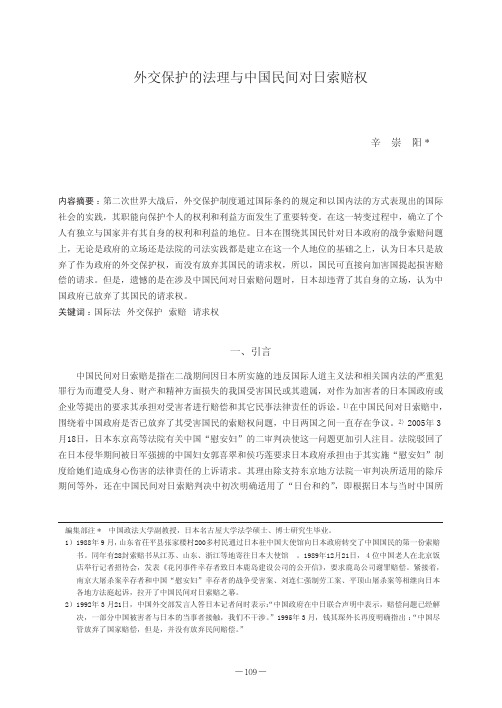
外交保护的法理与中国民间对日索赔权辛 崇 阳*内容摘要:第二次世界大战后,外交保护制度通过国际条约的规定和以国内法的方式表现出的国际社会的实践,其职能向保护个人的权利和利益方面发生了重要转变。
在这一转变过程中,确立了个人有独立与国家并有其自身的权利和利益的地位。
日本在围绕其国民针对日本政府的战争索赔问题上,无论是政府的立场还是法院的司法实践都是建立在这一个人地位的基础之上,认为日本只是放弃了作为政府的外交保护权,而没有放弃其国民的请求权,所以,国民可直接向加害国提起损害赔偿的请求。
但是,遗憾的是在涉及中国民间对日索赔问题时,日本却违背了其自身的立场,认为中国政府已放弃了其国民的请求权。
关键词:国际法 外交保护 索赔 请求权一、引言 中国民间对日索赔是指在二战期间因日本所实施的违反国际人道主义法和相关国内法的严重犯罪行为而遭受人身、财产和精神方面损失的我国受害国民或其遗属,对作为加害者的日本国政府或企业等提出的要求其承担对受害者进行赔偿和其它民事法律责任的诉讼。
在中国民间对日索赔中,围绕着中国政府是否已放弃了其受害国民的索赔权问题,中日两国之间一直存在争议。
2005年3月18日,日本东京高等法院有关中国“慰安妇”的二审判决使这一问题更加引人注目。
法院驳回了在日本侵华期间被日军强掳的中国妇女郭喜翠和侯巧莲要求日本政府承担由于其实施“慰安妇”制度给她们造成身心伤害的法律责任的上诉请求。
其理由除支持东京地方法院一审判决所适用的除斥期间等外,还在中国民间对日索赔判决中初次明确适用了“日台和约”,即根据日本与当时中国所編集部注* 中国政法大学副教授,日本名古屋大学法学硕士、博士研究生毕业。
1)1988年9月,山东省茌平县张家楼村200多村民通过日本驻中国大使馆向日本政府转交了中国国民的第一份索赔书。
同年有28封索赔书从江苏、山东、浙江等地寄往日本大使馆 。
1989年12月21日,4位中国老人在北京饭店举行记者招待会,发表《花冈事件幸存者致日本鹿岛建设公司的公开信》,要求鹿岛公司谢罪赔偿。
浅论外交保护制度
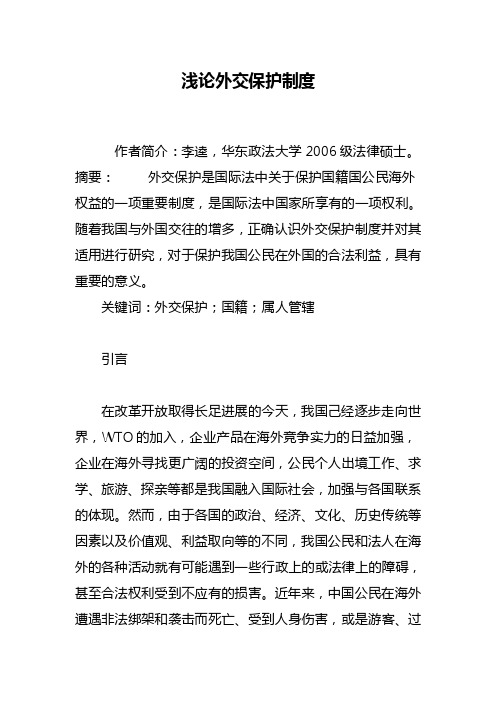
浅论外交保护制度作者简介:李逵,华东政法大学2006级法律硕士。
摘要:外交保护是国际法中关于保护国籍国公民海外权益的一项重要制度,是国际法中国家所享有的一项权利。
随着我国与外国交往的增多,正确认识外交保护制度并对其适用进行研究,对于保护我国公民在外国的合法利益,具有重要的意义。
关键词:外交保护;国籍;属人管辖引言在改革开放取得长足进展的今天,我国己经逐步走向世界,WTO的加入,企业产品在海外竞争实力的日益加强,企业在海外寻找更广阔的投资空间,公民个人出境工作、求学、旅游、探亲等都是我国融入国际社会,加强与各国联系的体现。
然而,由于各国的政治、经济、文化、历史传统等因素以及价值观、利益取向等的不同,我国公民和法人在海外的各种活动就有可能遇到一些行政上的或法律上的障碍,甚至合法权利受到不应有的损害。
近年来,中国公民在海外遭遇非法绑架和袭击而死亡、受到人身伤害,或是游客、过境客权益受到侵犯的案例屡见不鲜。
有些国家甚至掀起了有针对性地袭击中国人的浪潮。
如何保障法人、公民在他国的各种合法的民事、经济活动顺利地进行,依据当地法律所取得的权利受到公正的司法保护,在受到不公正待遇的时候得到救济便是国际法中外交保护制度所要研究和解决的问题。
一、外交保护制度概述外交保护(DiplomaticProtection),是指当本国国民在国外的合法权益受到所在国国际不法行为的侵害,且用尽了当地救济方法仍得不到解决时,国家对该外国采取外交行动以保护本国国民的国家行为。
[1]外交保护制度与国家主权关系密切,直接涉及公民切身利益,在调整国际关系、建立国际社会新秩序的进程中起着不可小觑的作用,在国际法发展进程中扮演着重要角色。
据《左传》记载:我国早在春秋时期的诸侯国之间就出现了《使节法》。
其规定:外交使节代表君主,不得侮辱,不得伤害。
根据《周礼》,凡危害使节者,加以处罚,对非礼的国家可兴师问罪。
在这种早期的国际法雏形中,使节的特殊礼遇表明古代人们己经产生了尊重国家主权(当时认为是君主)、维护国民利益的早期国际法思想。
对《外交保护条款草案》的解读
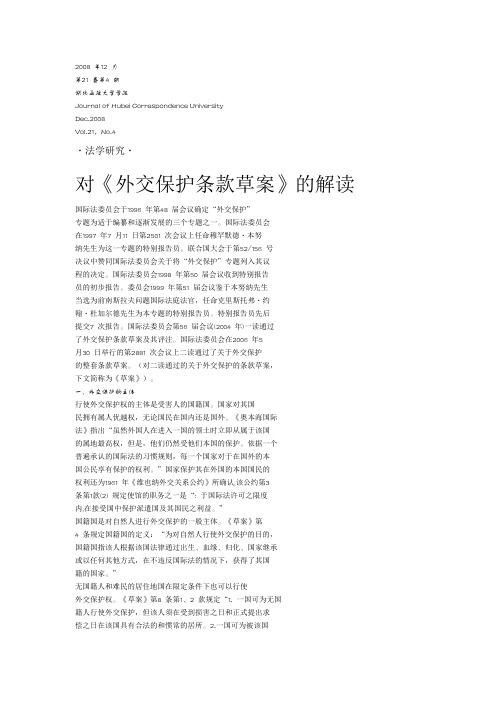
2008 年12 月第21 卷第4 期湖北函授大学学报Journal of Hubei Correspondence UniversityDec.2008Vol.21,No.4·法学研究·对《外交保护条款草案》的解读国际法委员会于1996 年第48 届会议确定“外交保护”专题为适于编纂和逐渐发展的三个专题之一。
国际法委员会在1997 年7 月11 日第2501 次会议上任命穆罕默德·本努纳先生为这一专题的特别报告员。
联合国大会于第52/156 号决议中赞同国际法委员会关于将“外交保护”专题列入其议程的决定。
国际法委员会1998 年第50 届会议收到特别报告员的初步报告。
委员会1999 年第51 届会议鉴于本努纳先生当选为前南斯拉夫问题国际法庭法官,任命克里斯托弗·约翰·杜加尔德先生为本专题的特别报告员。
特别报告员先后提交7 次报告。
国际法委员会第56 届会议(2004 年)一读通过了外交保护条款草案及其评注。
国际法委员会在2006 年5月30 日举行的第2881 次会议上二读通过了关于外交保护的整套条款草案。
(对二读通过的关于外交保护的条款草案,下文简称为《草案》)。
一、外交保护的主体行使外交保护权的主体是受害人的国籍国。
国家对其国民拥有属人优越权,无论国民在国内还是国外。
《奥本海国际法》指出“虽然外国人在进入一国的领土时立即从属于该国的属地最高权,但是,他们仍然受他们本国的保护。
依据一个普遍承认的国际法的习惯规则,每一个国家对于在国外的本国公民享有保护的权利。
”国家保护其在外国的本国国民的权利还为1961 年《维也纳外交关系公约》所确认,该公约第3条第1款(2) 规定使馆的职务之一是“: 于国际法许可之限度内,在接受国中保护派遣国及其国民之利益。
”国籍国是对自然人进行外交保护的一般主体。
《草案》第4 条规定国籍国的定义:“为对自然人行使外交保护的目的,国籍国指该人根据该国法律通过出生、血缘、归化、国家继承或以任何其他方式,在不违反国际法的情况下,获得了其国籍的国家。
diplomatic immunity外交豁免

《罗摩衍那》与《摩诃婆罗多》并列为 印度两大史诗。
3 HISTORY
In ancient China, wars surged up between the kingdoms from time to time . Back to Xia, Shang and Zhou dynasties, diplomacy began to play an important role to reduce the harm and duration of wars. There was an ancient Chinese proverb saying: ”When two countries are at war, messengers or diplomats should not be killed or arrested. “ 中国有句俗语“两国交战,不斩来使”, 体现了外交豁免权的精神。
3
4
Diplomatic immunity abandon, abandon diplomatic immunity or not to send the right, is not affected by the diplomatic personnel decide their own autonomous consciousness. 外交豁免权舍弃问题,抛弃外交豁免权与 否为派驻国之权利,不受该名外交人员自 主意识决定。
2 NOTES
3
It is possible for the official's home country to waive immunity; this tends to happen only when the individual has committed a serious crime, unconnected with their diplomatic role or has witnessed such a crime. Normally, individuals have no authority to waive their own immunity. 抛弃外交豁免权与否为派驻国之权利,不受该 名外交人员自主意识决定。
- 1、下载文档前请自行甄别文档内容的完整性,平台不提供额外的编辑、内容补充、找答案等附加服务。
- 2、"仅部分预览"的文档,不可在线预览部分如存在完整性等问题,可反馈申请退款(可完整预览的文档不适用该条件!)。
- 3、如文档侵犯您的权益,请联系客服反馈,我们会尽快为您处理(人工客服工作时间:9:00-18:30)。
Diplomatic ProtectionP ART O NEG ENERAL P ROVISIONSArticle 1Definition and scopeFor the purposes of the present draft articles, diplomatic protection consists of the invocation by a State, through diplomatic action or other means of peaceful settlement, of the responsibility of another State for an injury caused by an internationally wrongful act of that State to a natural or legal person that is a national of the former State with a view to the implementation of such responsibility.Article 2Right to exercise diplomatic protectionA State has the right to exercise diplomatic protection in accordance with thepresent draft articles.P ART T WON ATIONALITYC HAPTER IG ENERAL P RINCIPLESArticle 3Protection by the State of nationality1. The State entitled to exercise diplomatic protection is the State of nationality.2. Notwithstanding paragraph 1, diplomatic protection may be exercised by aState in respect of a person that is not its national in accordance with draft article 8.C HAPTER IIN ATURAL P ERSONSArticle 4State of nationality of a natural personFor the purposes of the diplomatic protection of a natural person, a State of nationality means a State whose nationality that person has acquired, in accordance with the law of that State, by birth, descent, naturalization, succession of States or in any other manner, not inconsistent with international law.Article 5Continuous nationality of a natural person1. A State is entitled to exercise diplomatic protection in respect of a person whowas a national of that State continuously from the date of injury to the date of the official presentation of the claim. Continuity is presumed if that nationality existed at both these dates.2. Notwithstanding paragraph 1, a State may exercise diplomatic protection in respect of a person who is its national at the date of the official presentation of the claim but was not a national at the date of injury, provided that the person had the nationality of a predecessor State or lost his or her previous nationality and acquired, for a reason unrelated to the bringing of the claim, the nationality of the former State in a manner not inconsistent with international law.3. Diplomatic protection shall not be exercised by the present State of nationality in respect of a person against a former State of nationality of that person for an injury caused when that person was a national of the former State of nationality and not of the present State of nationality.4. A State is no longer entitled to exercise diplomatic protection in respect of a person who acquires the nationality of the State against which the claim is brought after the date of the official presentation of the claim.Article 6Multiple nationality and claim against a third State1. Any State of which a dual or multiple national is a national may exercise diplomatic protection in respect of that national against a State of which that person is not a national.2. Two or more States of nationality may jointly exercise diplomatic protection in respect of a dual or multiple national.Article 7Multiple nationality and claim against a State of nationalityA State of nationality may not exercise diplomatic protection in respect of a person against a State of which that person is also a national unless the nationality of the former State is predominant, both at the date of injury and at the date of the official presentation of the claim.Article 8Stateless persons and refugees1. A State may exercise diplomatic protection in respect of a stateless person who, at the date of injury and at the date of the official presentation of the claim, is lawfully and habitually resident in that State.2. A State may exercise diplomatic protection in respect of a person who is recognized as a refugee by that State, in accordance with internationally accepted standards, when that person, at the date of injury and at the date of the official presentation of the claim, is lawfully and habitually resident in that State.3. Paragraph 2 does not apply in respect of an injury caused by an internationally wrongful act of the State of nationality of the refugee.C HAPTER IIIL EGAL P ERSONSArticle 9State of nationality of a corporationFor the purposes of the diplomatic protection of a corporation, the State of nationality means the State under whose law the corporation was incorporated. However, when the corporation is controlled by nationals of another State or States and has no substantial business activities in the State of incorporation, and the seat of management and the financial control of the corporation are both located in another State, that State shall be regarded as the State of nationality.Article 10Continuous nationality of a corporation1. A State is entitled to exercise diplomatic protection in respect of a corporation that was a national of that State, or its predecessor State, continuously from the date of injury to the date of the official presentation of the claim. Continuity is presumed if that nationality existed at both these dates.2. A State is no longer entitled to exercise diplomatic protection in respect of a corporation that acquires the nationality of the State against which the claim is brought after the presentation of the claim.3. Notwithstanding paragraph 1, a State continues to be entitled to exercise diplomatic protection in respect of a corporation which was its national at the date of injury and which, as the result of the injury, has ceased to exist according to the law of the State of incorporation.Article 11Protection of shareholdersA State of nationality of shareholders in a corporation shall not be entitled to exercise diplomatic protection in respect of such shareholders in the case of an injury to the corporation unless:(a) the corporation has ceased to exist according to the law of the State of incorporation for a reason unrelated to the injury; or(b) the corporation had, at the date of injury, the nationality of the State alleged to be responsible for causing the injury, and incorporation in that State was required by it as a precondition for doing business there.Article 12Direct injury to shareholdersTo the extent that an internationally wrongful act of a State causes direct injury to the rights of shareholders as such, as distinct from those of the corporation itself, the State of nationality of any such shareholders is entitled to exercise diplomatic protection in respect of its nationals.Article 13Other legal personsThe principles contained in this chapter shall be applicable, as appropriate, to the diplomatic protection of legal persons other than corporations.P ART T HREEL OCAL R EMEDIESArticle 14Exhaustion of local remedies1. A State may not present an international claim in respect of an injury to a national or other person referred to in draft article 8 before the injured person has, subject to draft article 15, exhausted all local remedies.2. “Local remedies” means legal remedies which are open to an injured person before the judicial or administrative courts or bodies, whether ordinary or special, of the State alleged to be responsible for causing the injury.3. Local remedies shall be exhausted where an international claim, or request for a declaratory judgement related to the claim, is brought preponderantly on the basis of an injury to a national or other person referred to in draft article 8.Article 15Exceptions to the local remedies ruleLocal remedies do not need to be exhausted where:(a) there are no reasonably available local remedies to provideeffective redress, or the local remedies provide no reasonable possibility of such redress;(b) there is undue delay in the remedial process which is attributable to the State alleged to be responsible;(c) there was no relevant connection between the injured person and the State alleged to be responsible at the date of injury;(d) the injured person is manifestly precluded from pursuing local remedies; or(e) the State alleged to be responsible has waived the requirement that local remedies be exhausted.P ART F OURM ISCELLANEOUS P ROVISIONSArticle 16Actions or procedures other than diplomatic protectionThe rights of States, natural persons, legal persons or other entities to resort under international law to actions or procedures other than diplomatic protection tosecure redress for injury suffered as a result of an internationally wrongful act, are not affected by the present draft articles.Article 17Special rules of international lawThe present draft articles do not apply to the extent that they are inconsistent with special rules of international law, such as treaty provisions for the protection of investments.Article 18Protection of ships’ crewsThe right of the State of nationality of the members of the crew of a ship to exercise diplomatic protection is not affected by the right of the State of nationality of a ship to seek redress on behalf of such crew members, irrespective of their nationality, when they have been injured in connection with an injury to the vessel resulting from an internationally wrongful act.Article 19Recommended practiceA State entitled to exercise diplomatic protection according to the present draft articles, should:(a) give due consideration to the possibility of exercising diplomatic protection, especially when a significant injury has occurred;(b) take into account, wherever feasible, the views of injured persons with regard to resort to diplomatic protection and the reparation to be sought; and(c) transfer to the injured person any compensation obtained for the injury from the responsible State subject to any reasonable deductions.。
